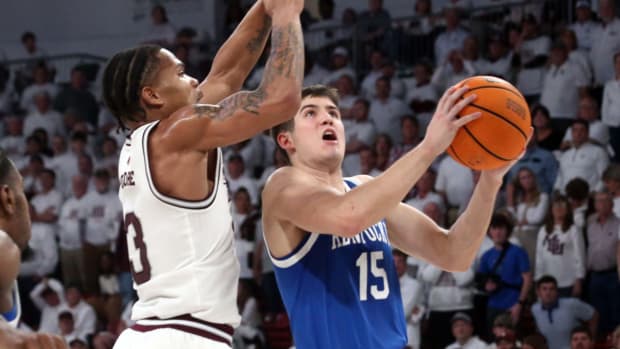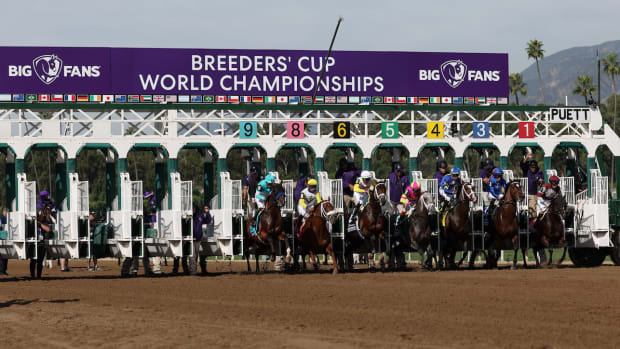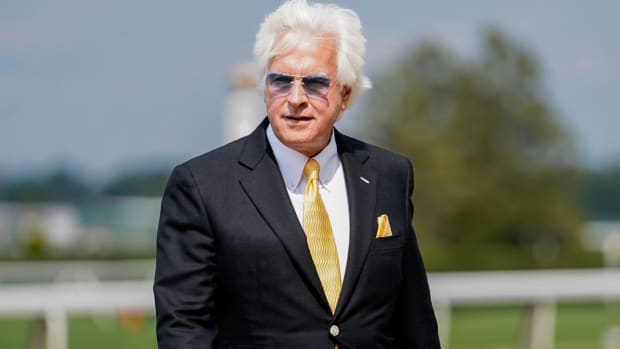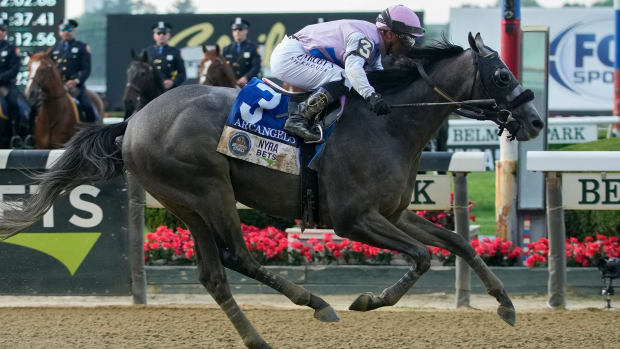Justify Emerges From the Fog at Preakness to Keep Triple Crown Pursuit Alive
BALTIMORE – Way over on the far turn at Pimlico, they disappeared into the fog. Over beyond the top of the giant infield stage where all day long in the rain, bass beats had thundered from an infield concert and people had drunk too much (or just enough) and thrown themselves into the brown mud. Over toward the old cinderblock horse barns, indestructible, low-slung utilitarian relics that stand on the far side of the racetrack. Over in the direction of the battered North Baltimore neighborhood that struggles to its feet every year in the middle of May and shares its being with the high and mighty of the horse racing world.
Way over there, two three-year-old colts swung into the final turn of the 143rd Preakness, and were gone, left to the imagination in the mist, a milky haze that descended upon Pimlico in the aftermath of rain that had fallen for more than four days and left the track as sodden as an Irish bog. One of the horses was Justify, the dominant winner of the Kentucky Derby two weeks earlier, a precocious, 1,270-pound specimen who had become the first horse in 136 years to win the Derby without having raced as a two-year-old, ending a curse named for Apollo, the last horse to achieve the feat, in 1882. The other was Good Magic, who not only ran as a two-year-old, but won the sport’s two-year-old championship, but could do better than second in Louisville, a soundly beaten 2 ½ lengths behind Justify. Behind them, at least four other horses rumbled through the slop, readying an assault on the leaders if they faltered. Which they would. Bravely, but nonetheless.
It would all end with racing back where it was three years ago (and many times before), with a talented horse one race away from the Triple Crown, this time just three years after the last, and not the desperate 37 that separated Affirmed from American Pharoah and turned the 2015 Belmont Stakes into a roaring moment of history. It would end with Justify, still unbeaten in a whirlwind five-race career that began only in February and, if he emerges healthy from the Preakness, headed to the Belmont Stakes on June 9 with a chance to become the sport’s 13th Triple Crown winner. But for a long, strange 20 seconds, there was only a bizarre and uncertain blindness.
In a saddling paddock beneath the Pimlico grandstand, Justify’s trainer, Bob Baffert watched the race unfold on a tiny television screen, exactly where he watched three years ago as American Pharoah—who he also trained—destroyed the Preakness field in similar slop, en route to the Triple Crown. Next to him were his wife, Jill, and their 13-year-old son, Bode, as they had been in 2015. Behind him, two of his four older children from his first marriage, Canyon, 29, and Forest, 27. They had missed Pharoah’s Preakness while attending a wedding and damn near upstaged the bride while screaming for Pharoah. There would be no destroying on this day; there would be courage and survival… only some of it visible.
Justify Elicits Comparisons to American Pharoah in First Step of Following Same Historic Path
“I can’t see them,” said Baffert, eyes fixed on the screen. There was only a grey snow on the screen, vague images bouncing along like spectres from a NASA moon landing.
Two weeks earlier the Derby had gone almost perfectly. Justify—who Baffert loved enough to hustle him all the way to the Derby on three career starts, the first only on Feb. 18, 77 days before the Run for the Roses—broke sharply, passed an overmatched sprinter and rolled to the win.
Again, in Baltimore, Baffert wanted a clean, sharp break most of all. On the infield before the race, he said to jockey Mike Smith, the 52-year-old physical (and mental) marvel who’s called Big Money Mike for a reason, “Just come back clean,” no easy task in the eggshell-white silks of part owner WinStar Farm. “Get him out of there, ain’t gonna be no 24 [-second first quarter].” The message was clear: Take the lead and keep it. (In a surreal moment befitting a surreal day, the last person Baffert spoke to before giving Smith a leg up on Justify was Bill Belichick, with whom Baffert has struck up a friendship. They spoke briefly and Baffert said to Belichick, “Hey, I might need a last-second field goal today.” And in essence, he did.)
And again, Justify broke clean. But inside him, Good Magic broke cleanly, too and would not yield the lead. Good Magic’s trainer, Chad Brown, did not want an early duel with Justify. “I didn’t want the horse on the lead,” Brown said after the race. “I’m disappointed in the trip. I wanted to sit off the pace and follow [Justify] around the track. Instead, he followed us around the track.” They went the first quarter-mile in 23.11 seconds and the half in 47.19, slower than the Derby. But this track was hard and also heavy, drying into a tiring sludge. And the two colts were battling early.
Smith did not know Brown’s preference. He knew only that he had been engaged by a good racehorse, and too soon. “I looked over and saw Good Magic,” said Smith, “And I thought, ‘Oh man, it’s going to be a match race.’”
That is the way they galloped up the backstretch, until they disappeared.
In the middle of the turn, Canyon Baffert shouted, “He’s making his move.” Maybe he was. Maybe he wasn’t. The words seemed more hopeful than informed.
In box seats above the finish, 82-year-old Hall of Fame trainer and legend-in-residence D. Wayne Lukas also lost the race to the fog. “I couldn’t see them,” he would say afterward. “I picked them up when everybody else did.” Racetracks are sprawling and horses distant.
In the turn, Smith felt Good Magic’s jockey, Jose Ortiz, trying to push him outside to make him run further and become more tired. Ortiz was confident. “Mike called on his horse before I called on mine,” he said to Brown as they left the track after the race. This is a sign that Justify had become tired before Good Magic. “I had more horse than [Smith].”
Remembering William Nack: A Passionate, Personable Master of His Craft
Slowly, like ghosts from the twilight, the field emerged just past the top of the stretch. Justify had opened a narrow lead, but Good Magic was not yielding, and more ominously, even on a day when it was nearly impossible for horses to win races from far off the pace, two colts were gaining on the tiring leaders. In the paddock, the television feed switched to view from behind the field and Baffert could see both the black-and-gold silks of the Lukas-trained Bravazo, who had finished a surprising sixth in the Derby, and the white “W” of the Winchell Thoroughbreds-owned Tenfold.
Arms crossed, impassive, Baffert said, “Uh-oh.”
As the tired field became visible, the drenched crowd of 134,487 awakened and roared. Justify dug in, but Good Magic did not yield. “He gave me what he had,” said Ortiz.
With a little more than an eighth of a mile to run, Justify edged away by a half-length. Smith tried to gear him down, thinking the race was won and looking three weeks ahead. “Save something for the next one,” he said. Good Magic fought back and Smith had to ask Justify for more. On the outside, covered in mud, both Bravazo and Tenfold were slicing into the leaders with every stride. Lukas could see them now.
Four horses drove to the wire. Beneath the stands, the Baffert family screamed, voices undistinguishable from each other. High voices and low ones, kids and adults.
Come on Mike!
Come on baby!
Get into him!
At last came the wire and all the many Bafferts exploded into each others’ arms, as Justify held clear by half a length over Tenfold, who was neck in front of Bravazo, who was another neck in front of the game Good Magic, who had done so much work. “I’m disappointed,” Brown would say afterward. “But he did not give up.” And Justify? “He’s a great horse. He proved it again today. I thought he ran a great race. But he did not take the heat from us. We took the heat from him, down on the inside.”
In the immediate aftermath of the race, Baffert hustled out of the paddock and into the slop on the racetrack, en route to the infield victory ceremony. “That was tough,” he said. “He didn’t bring his A Game. But he was good. He was good enough. It takes a great horse to win like that.”
An hour after it was over, out at Pimlico stakes barn, a green, wooden building next to a busy parking lot, Lukas sat in a plastic chair and leaned back against a wall. Bravazo had come close, like Tenfold and Good Magic. Lukas has lost none of his fire. Like Brown, he was stinging from the near miss. “My horse was really running,” he said, a yellow power tie falling down the front of his white shirt.
They were all tired: The trainers, the horses, the fans. So often in recent years, for all those decades that racing pursued another Triple Crown, Derbies and its Preaknesses were defined by dominance and described in the language of soaring potential. On this day Justify disappeared into the fog and emerged not dominant, but dogged. He will face a daunting challenge in New York, the sixth race of his life in only 111 days.
But that is three weeks away. On this day, in the rain and the mud and the fog, he was the best of four who would not fall away. The best of four who gave the best of themselves to the end. Not a performance, but a race. Not a prelude to something more, but a finished product in itself. An opera in the mist, a Preakness for the ages. Way over there.





